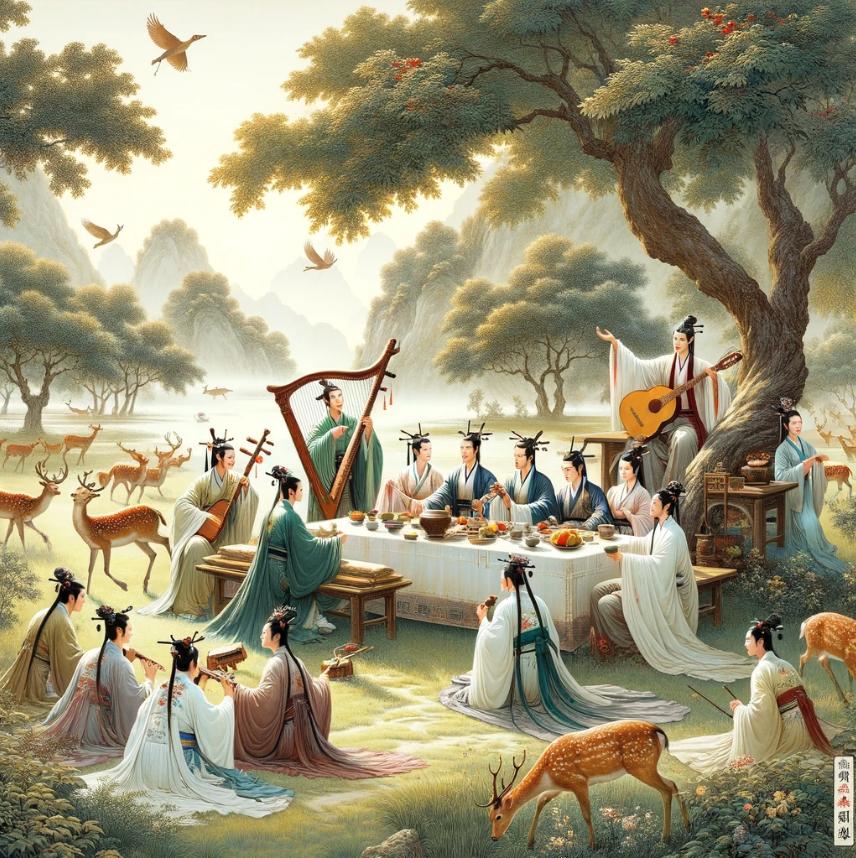
呦呦鹿鸣,食野之苹。
我有嘉宾,鼓瑟吹笙。
吹笙鼓簧,承筐是将。
人之好我,示我周行。
呦呦鹿鸣,食野之蒿。
我有嘉宾,德音孔昭。
视民不恌,君子是则是效。
我有旨酒,嘉宾式燕以敖。
呦呦鹿鸣,食野之芩。
我有嘉宾,鼓瑟鼓琴。
鼓瑟鼓琴,和乐且湛。
我有旨酒,以燕乐嘉宾之心。
句子成分标记:【主语】,〖谓语/谓语动词〗,〘宾语/表语〙,〔定语〕,[状语],〈补语〉,{插入语/主谓句},『词组/短语』
古文:呦呦鹿鸣,食野之苹。
结构:{呦呦(拟声)}{鹿(名)鸣(动)},〖食(动)〘〔野(名)之(助)〕苹(名)〙〗。
白话文:哞哞鹿在叫,吃着野地的艾蒿。
英文:The mooing deer is calling, eating the wild mugwort in the field.
[注]:呦呦〔yōu yōu〕:拟声词,鹿鸣声。苹:艾蒿,一说浮萍。
古文:我有嘉宾,鼓瑟吹笙。
结构:{我(代)〖有(动)嘉宾(名)〗},〖『鼓(动)瑟(名)』『吹(动)笙(名)』〗。
白话文:我有贵客,敲着瑟吹着笙。
英文:I have distinguished guests, playing the Se and blowing the Sheng.
古文:吹笙鼓簧,承筐是将。
结构:〖『吹(动)笙(名)』『鼓(动)簧(名)』〗,〖『承(动)筐(名)』是(连)将(动)〗。
白话文:吹着笙鼓着簧,承上筐并且进献。
英文:Blowing the Sheng and beating the reed, carrying the basket and offering it.
[注]:承筐是将:承筐,奉上盛有币帛的竹筐,后代指迎接宾客。将(jiāng),送,献。
古文:人之好我,示我周行。
结构:{人(名)之(助)〖好(形转动)我(代)〗},〖示(动)〘我(代词)〙〘周(名)行(名)〙〗。
白话文:人们对我友善,为我指示道理。
英文:People are kind to me, showing me the way.
[注]:好:善的意思,转为动词。周行(háng):周朝行列,引申为周朝道理。示我周行:双宾语。
古文:呦呦鹿鸣,食野之蒿。
结构:{呦呦(拟声)}{鹿(名)鸣(动)},〖食(动)〘〔野(名)之(助)〕蒿(名)〙〗。
白话文:哞哞鹿在叫,吃着野地的青蒿。
英文:The mooing deer is calling, eating the wild mugwort in the field.
古文:我有嘉宾,德音孔昭。
结构:{我(代)〖有(动)嘉宾(名)〗},{【德(名)音(名)】〖孔(副)昭(动)〗}。
白话文:我有贵客,德行声誉很昭彰。
英文:I have distinguished guests, their moral reputation are very prominent.
[注]:德音:美好的品德和声誉。孔:很。
古文:视民不恌,君子是则是效。
结构:〖视(动)〘民(名)〙〘不(副)恌(形)〙〗,{君子(名)〖是(代)则(动)是(代)效(动)〗}。
白话文:待人宽厚不刻薄,君子视它为准则并效法它。
英文:Be generous and not harsh to people, gentlemen takes it as a rule.
[注]:视:示,对待。恌(tiāo):同“佻”,轻薄。则:效法。效:效法。视民不恌:双宾语
古文:我有旨酒,嘉宾式燕以敖。
结构:{我(代)〖有(动)〘旨(形)酒(名)〙〗},{嘉宾(名)〖式(助)燕(动)以(连)敖(动)〗}
结构:{我(代)【有(动)〘旨(形)酒(名)〙】},{嘉宾(名)【式(助)燕(动)以(介)敖(动)】}。
白话文:我有上好的美酒,贵客们畅饮作乐。
英文:I have fine wine, my guests are reveling in delight.
[注]:旨:甘美。式燕以敖:式,语气助词,无实义。燕,同“宴”,宴饮。敖,同“遨”,遨游,游乐。
古文:呦呦鹿鸣,食野之芩。
结构:{呦呦(拟声)}{鹿(名)鸣(动)},〖食(动)〘〔野(名)之(助)〕芩(名)〙〗。
白话文:哞哞鹿在叫,吃着野地的芩草。
英文:The mooing deer is calling, eating the wild aster in the field.
[注]:芩(qín):草名,蒿类植物。
古文:我有嘉宾,鼓瑟鼓琴。
结构:{我(代)〖有(动)嘉宾(名)〗},〖『鼓(动)瑟(名)』『鼓(动)琴(名)』〗。
白话文:我有贵客,敲着瑟弹着琴。
英文:I have distinguished guests, playing the Se and plucking the Qin.
古文:鼓瑟鼓琴,和乐且湛。
结构:〖『鼓(动)瑟(名)』『鼓(动)琴(名)』〗,〖『和(形)乐(形)』且(连)湛(形)〗。
白话文:敲着瑟弹着琴,祥和欢乐又深沉。
英文:Playing the Se and the Qin, peaceful, joyful, yet profound.
[注]:湛(dān):通“耽”,深厚
古文:我有旨酒,以燕乐嘉宾之心。
结构:{我(代)〖有(动)〘旨(形)酒(名)〙〗},〖以(连)『燕(动)乐(动)』〘〔嘉宾(名)之(助)〕心(名)〙〗
白话文:我有上好的美酒,用来欢乐和款待嘉宾。
英文:I have fine wine, to entertain and delight my guests.
[注]:燕,同“宴”,宴饮。
《鹿鸣》是《诗经》中“小雅”部分的一篇,属于“鹿鸣之什”系列。这首诗通过描绘一个盛大宴会上的场景,展示了一种和谐与秩序井然的社会理想。宴会上,宾主尽欢,人们歌唱、舞蹈,共同享受着和平繁荣的时代。
《鹿鸣》不仅是一首富有礼仪的宴会之诗,更通过这样的场合,传达了君子亲近贤士,以德音相交的思想。整首诗歌洋溢着周礼的风范,反映了上古时期的社交礼节及其背后的和谐理想。
